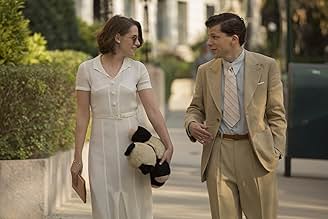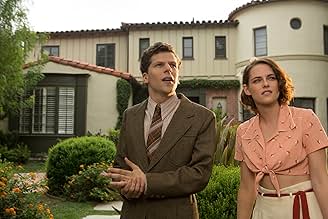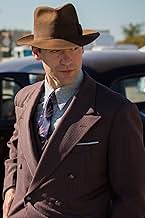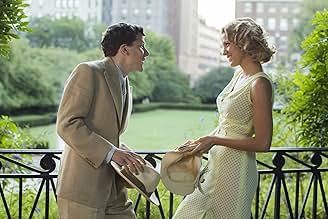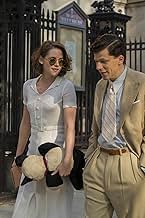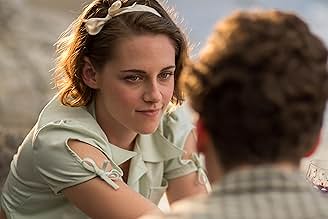PUNTUACIÓN EN IMDb
6,6/10
84 mil
TU PUNTUACIÓN
En la década de los años treinta, un nativo del Bronx se muda a Hollywood y se enamora de una joven que está viendo a un hombre casado.En la década de los años treinta, un nativo del Bronx se muda a Hollywood y se enamora de una joven que está viendo a un hombre casado.En la década de los años treinta, un nativo del Bronx se muda a Hollywood y se enamora de una joven que está viendo a un hombre casado.
- Premios
- 8 nominaciones en total
Reseñas destacadas
I myself am a sucker for a movie that gives a take on old school Hollywood and Woody Allen did a beautiful job with Cafe Society.
The cinematography on this one did a great job of capturing the feel of 1930s California and New York city. I can't get over how beautiful this thing was shot. A knock out combination of lights setting and music to bring out the mood.
And the jazz numbers that lace this flick did just that for setting that beautiful tone
Jesse Eisenberg started off a little too much Woody Allen at first (one particular scene in the beginning that acts like a hilarious sketch routine, where Jesse's character Bobby buys a hooker). It did get some getting use to, before it became his own thing.
Corey Stoll's character Ben, a though Jew who becomes a night club owner, whole involvement in the film taste like Scorsese light, which only made it even that more interesting.
It's a good Woody Allen comedy,but They are all good to me. If you like one you like them all (but I'm more partial to the ones he does not star in, like this one), and it's super impressive he does one of these on annual basis and he's able keep the quality constant.
It'a funny film with laugh out loud moments, and very crafty narrative narrated by Allen himself. This movie is just another love letter with the city he loves (and a thoughtful P.S you're OK too California), and makes Woody feel like such a helpless romantic, but that's what makes the movie so good to watch.
http://cinemagardens.com/?p=55
The cinematography on this one did a great job of capturing the feel of 1930s California and New York city. I can't get over how beautiful this thing was shot. A knock out combination of lights setting and music to bring out the mood.
And the jazz numbers that lace this flick did just that for setting that beautiful tone
Jesse Eisenberg started off a little too much Woody Allen at first (one particular scene in the beginning that acts like a hilarious sketch routine, where Jesse's character Bobby buys a hooker). It did get some getting use to, before it became his own thing.
Corey Stoll's character Ben, a though Jew who becomes a night club owner, whole involvement in the film taste like Scorsese light, which only made it even that more interesting.
It's a good Woody Allen comedy,but They are all good to me. If you like one you like them all (but I'm more partial to the ones he does not star in, like this one), and it's super impressive he does one of these on annual basis and he's able keep the quality constant.
It'a funny film with laugh out loud moments, and very crafty narrative narrated by Allen himself. This movie is just another love letter with the city he loves (and a thoughtful P.S you're OK too California), and makes Woody feel like such a helpless romantic, but that's what makes the movie so good to watch.
http://cinemagardens.com/?p=55
There is a lot going against this movie. Jesse Eisenberg's character comes off as a complete asshole within 10 minutes of the film, thanks to a really terrible scene between him and a Jewish hooker. None of the humor in that scene landed, which just made the situation really sad and uncomfortable to watch, and then kind of difficult to root for Eisenberg at all after that. Steve Carell isn't bad by any means, but he seems incredibly miscast in a role like this (not to say that he can't act in roles that are more serious, but this Hollywood film executive didn't really suit him). Both of the Dorfman parents come off as really awkward on screen and thus kill any of the jokes that they're meant to deliver. The only actor that gives a notable performance in this movie is Corey Stoll as the brother, but it's not enough. Kristin Stewart was mostly fine, but occasionally started picking up some of her infamous Kristin Stewartisms throughout. Carell and Eisenberg become really close out of nowhere, both of the couples' relationships are sped up by Woody Allen's narration (which doesn't really add anything to this film), and this movie is only 90 minutes long, so I feel as if they could have definitely spent more time with all of these relationships, instead of just having Woody tell us what was happening. And on top of all of this, while this is a beautiful film to look at, there is nothing new in this movie. It's another Woody Allen movie with the same romances and love triangles centered around white people who like jazz with a pretty inconclusive and unsatisfying ending.
Director/writer Woody Allen's latest film can be seen as one of his most personal films to date. Dialed to the bright, nostalgic feel of Radio Days (1987), Cafe Society nevertheless reels from an undercurrent of existential authenticity a la Husbands and Wives (1992) poetically and often ruefully addressing the feeling of having lost the road not taken.
Our protagonist is young up-and-comer Bobby Dorfman (Eisenberg), a New Yorker, whose dreams of making it in Hollywood rests uneasily over some very scrawny shoulders. At first he's aided by his Uncle Phil (Carell), an agent and powerhouse among the coastal elite. He sets him up as an assistant and script-reader. Bobby's family dutifully keeps tabs on him back in New York as he climbs the slippery ladder of Hollywood's well-to-do, finding friends in Steve (Schneider) and Rad Taylor (Posey) who have a hand in controlling the talent pipeline from coast to coast. His closest friend and eventual paramour however is Vonnie (Stewart) a comparatively down to earth secretary who would rather bask in the glow of the warm sun then in glitzy opulence. He idolizes her, pines for her despite her insistence that she has a boyfriend; an older man as we later find out.
Woody Allen himself provides the narration for this gentle nostalgia tour through Golden Age Hollywood. Much like his voice, the film feels warm, familiar if sadly slow and blunted. Lacking the consistently snappy tone of earlier works, Cafe Society leans a little too heavily on the love triangle, which granted, captures some excellent drama but is singed from overcooking. When we are rewarded with the usual delights of Allen's repertoire, it all comes out banal, like a list of axioms repeated one too many times.
Yet despite lacking the verbal excitement of Allen's prized filmography, Cafe Society more than delivers in gorgeous cinematography, characterization and themes which are glamorously brought to life by a talented cast. Steve Carell's natural amiability allows us to more easily welter in Phil's more unsavory character decisions which includes having his nephew wait in the waiting room of his office for weeks. He's an agent but he lacks the boorishness of Ari Gold. He believes in what he's selling, and given the way he name- drops by the poolside and the fondness industry insiders seem to have for him, you can tell he's good at what he does. Jesse Eisenberg brings the same frazzled nudnik buoyancy he previously brought to Allen's To Rome with Love (2012). It's easy to see why Eisenberg is a repeated player, the man brings all the trappings of Woody's old characters only with a slightly stronger edge.
If there's one standout however it would have to be Kristen Stewart who resists being the flavorless object of affection. Goodness knows it could have been easy given the time period of the film (not to mention her previous role in the Twilight Series (2008-2012)), but her strident autonomy keeps us invested. She's a piece of Citrine amid fool's gold, a girl next door above the ostentatiousness of industry fugazi. A girl to bring home to mamma.
Much of Bobby's character develops between the intoxicating glamour of Hollywood and the provocative corruptibility of New York City. The dichotomy has a night and day quality that is mirrored by the earthy Vonnie and the glittering Veronica (Lively) who appears later in the film. Large swaths of the movie take place in the Big Apple, much of which concentrates on the foibles of Bobby's sister (Lennick), brother-in-law (Kunken) and mobster brother (Stoll). Far from being unnecessary asides, these stories aptly meld into the film's large themes: love, respect and regret.
With the denseness of a novel and the light touch of Allen's finest, a question the emerges; what is the director trying to tell us through this story? Bobby's balance between the two cities he calls home, mimics Woody Allen's long, illustrious trajectory as a member of the New York intelligentsia and a Hollywood staple. Perhaps he's trying to tell us our problems may seem significant to us and every choice we make means another choice has been deferred, yet in the grand scheme of things, life is ultimately a comedy.
Our protagonist is young up-and-comer Bobby Dorfman (Eisenberg), a New Yorker, whose dreams of making it in Hollywood rests uneasily over some very scrawny shoulders. At first he's aided by his Uncle Phil (Carell), an agent and powerhouse among the coastal elite. He sets him up as an assistant and script-reader. Bobby's family dutifully keeps tabs on him back in New York as he climbs the slippery ladder of Hollywood's well-to-do, finding friends in Steve (Schneider) and Rad Taylor (Posey) who have a hand in controlling the talent pipeline from coast to coast. His closest friend and eventual paramour however is Vonnie (Stewart) a comparatively down to earth secretary who would rather bask in the glow of the warm sun then in glitzy opulence. He idolizes her, pines for her despite her insistence that she has a boyfriend; an older man as we later find out.
Woody Allen himself provides the narration for this gentle nostalgia tour through Golden Age Hollywood. Much like his voice, the film feels warm, familiar if sadly slow and blunted. Lacking the consistently snappy tone of earlier works, Cafe Society leans a little too heavily on the love triangle, which granted, captures some excellent drama but is singed from overcooking. When we are rewarded with the usual delights of Allen's repertoire, it all comes out banal, like a list of axioms repeated one too many times.
Yet despite lacking the verbal excitement of Allen's prized filmography, Cafe Society more than delivers in gorgeous cinematography, characterization and themes which are glamorously brought to life by a talented cast. Steve Carell's natural amiability allows us to more easily welter in Phil's more unsavory character decisions which includes having his nephew wait in the waiting room of his office for weeks. He's an agent but he lacks the boorishness of Ari Gold. He believes in what he's selling, and given the way he name- drops by the poolside and the fondness industry insiders seem to have for him, you can tell he's good at what he does. Jesse Eisenberg brings the same frazzled nudnik buoyancy he previously brought to Allen's To Rome with Love (2012). It's easy to see why Eisenberg is a repeated player, the man brings all the trappings of Woody's old characters only with a slightly stronger edge.
If there's one standout however it would have to be Kristen Stewart who resists being the flavorless object of affection. Goodness knows it could have been easy given the time period of the film (not to mention her previous role in the Twilight Series (2008-2012)), but her strident autonomy keeps us invested. She's a piece of Citrine amid fool's gold, a girl next door above the ostentatiousness of industry fugazi. A girl to bring home to mamma.
Much of Bobby's character develops between the intoxicating glamour of Hollywood and the provocative corruptibility of New York City. The dichotomy has a night and day quality that is mirrored by the earthy Vonnie and the glittering Veronica (Lively) who appears later in the film. Large swaths of the movie take place in the Big Apple, much of which concentrates on the foibles of Bobby's sister (Lennick), brother-in-law (Kunken) and mobster brother (Stoll). Far from being unnecessary asides, these stories aptly meld into the film's large themes: love, respect and regret.
With the denseness of a novel and the light touch of Allen's finest, a question the emerges; what is the director trying to tell us through this story? Bobby's balance between the two cities he calls home, mimics Woody Allen's long, illustrious trajectory as a member of the New York intelligentsia and a Hollywood staple. Perhaps he's trying to tell us our problems may seem significant to us and every choice we make means another choice has been deferred, yet in the grand scheme of things, life is ultimately a comedy.
The movie "Café Society" is a romantic comedy-drama and it follows a young man who moves to Hollywood in the 1930s and falls in love with his uncle's assistant. Woody Allen has once again delivered an excellent plot with his signature ingredients: Jewish characters, the mob, family dynamics, infidelity, jazz music, and the glamorous underworld of Hollywood studios and New York bars.
The always-Italian Vittorio Storaro's stunning cinematography brings back the nostalgia of the 1930s. The movie's big surprise is two newcomers at the time: Jesse Eisenberg as Bobby and Kristen Stewart as Vonnie, who manage to convey all the chemistry of lovers in doubt.
The movie has its ups and downs, but it manages to keep the viewer engaged until the end. Allen skillfully avoids falling into the trap of predictable and clichéd endings that are common in other Hollywood movies.
The always-Italian Vittorio Storaro's stunning cinematography brings back the nostalgia of the 1930s. The movie's big surprise is two newcomers at the time: Jesse Eisenberg as Bobby and Kristen Stewart as Vonnie, who manage to convey all the chemistry of lovers in doubt.
The movie has its ups and downs, but it manages to keep the viewer engaged until the end. Allen skillfully avoids falling into the trap of predictable and clichéd endings that are common in other Hollywood movies.
Really nice pic of the thirties.
Beautiful paintings but... something is missing the creepy family deserved more...
They were funny but not important enough it seems
¿Sabías que...?
- CuriosidadesThis is the first film since Crepúsculo (2008) that Kristen Stewart had to audition for to win the role.
- PifiasWhen Bobby comes to Phil's house and Phil tells him he is getting a divorce, there is a brief glimpse of the modern-day LA skyline in the upper right hand corner of the screen behind Phil.
- Banda sonoraI Didn't Know What Time It Was
Composed by Richard Rodgers & Lorenz Hart
Performed by Benny Goodman and His Orchestra
Courtesy of RCA Records
By arrangement with Sony Music Licensing
Selecciones populares
Inicia sesión para calificar y añadir a tu lista para recibir recomendaciones personalizadas
- How long is Café Society?Con tecnología de Alexa
Detalles
Taquilla
- Presupuesto
- 30.000.000 US$ (estimación)
- Recaudación en Estados Unidos y Canadá
- 11.103.205 US$
- Fin de semana de estreno en EE. UU. y Canadá
- 359.289 US$
- 17 jul 2016
- Recaudación en todo el mundo
- 43.763.247 US$
- Duración1 hora 36 minutos
- Color
- Mezcla de sonido
- Relación de aspecto
- 2.00 : 1
Contribuir a esta página
Sugerir un cambio o añadir el contenido que falta







